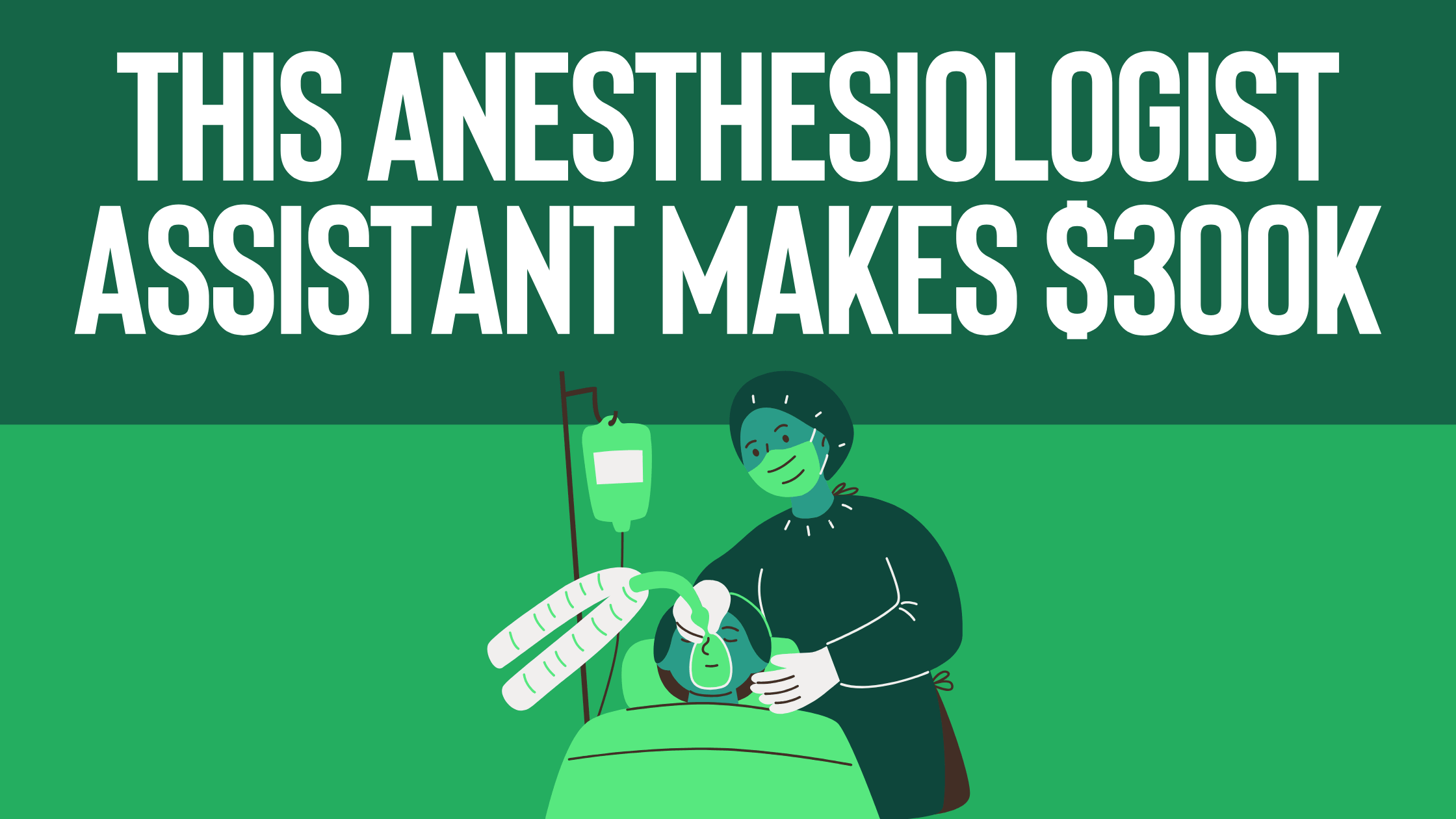How This Certified Anesthesiologist Assistant Makes $300K a Year Without Going to Medical School

How This Certified Anesthesiologist Assistant Makes $300K a Year Without Going to Medical School

Heads up: This article may include affiliate links or sponsored content from brands and products we trust or actually use ourselves. Using them doesn’t cost you a thing, but it helps support our mission.
You don’t have to go to medical school to land a high-paying healthcare job with a doctor-level salary. That’s exactly what Chabely Rodriguez proves as a certified anesthesiologist assistant (CAA) who makes $300,000 a year while sharing her story online through CAA Lifestyle, her side hustle where she mentors the next generation of non-MD anesthesia providers.
Starting with a chemistry major, she didn’t know her path would lead to the operating room. Her focus was originally on pharmacology and research rather than surgery. But the urge to make a more immediate impact on patients’ lives set her on a rewarding path in a lesser-known corner of medicine.
What her journey tells us is that there is no right or wrong path to take to make good money and create a flexible lifestyle. You can bend your career to fit your needs. It may just take a little experimentation to find what clicks.
After graduating with a degree in chemistry from Brooklyn College, Chabely started her career in clinical research. She loved contributing to long-term scientific advancements, but missed the personal connection and fast-paced energy of patient care.
“I craved a role where I could see the immediate effects of my care,” she explained. That spark led her to explore healthcare careers beyond becoming a doctor or nurse. She looked into physician assistant programs, then discovered the CAA field.
“Anesthesia stood out to me because of how quickly you can see your interventions take effect. A single medication can immediately relieve pain or reduce blood pressure. When I shadowed a CAA, I was hooked,” she said. “It had the perfect blend of real-time decision-making, procedural skills, and patient advocacy. I knew this was it.”
The path to becoming a CAA is rigorous but it doesn’t require any medical school – *queue the sigh of relief*. Instead, it requires a science-focused bachelor’s degree, a Master’s-level CAA program, and passing a national certification exam.
Here’s the typical process:
“CAA practice varies by state,” Chabely explained. “Some states fully recognize and license CAAs, while others currently don’t.” She recommends checking out the American Academy of Anesthesiologist Assistants (AAAA) for the latest legislative map or using her own interactive version.
She also noted that CAAs can work in all 50 states through the Veterans Affairs system, but the roles are limited. “The ultimate goal is state licensure, which provides more flexibility and broader access to different practice settings,” she clarified.
Recommended learning to get oriented while applying to programs:
Due to high demand and a provider shortage, CAA and anesthesia salaries have seen an upward trend. ZipRecruiter reports a nationwide average salary of $140K for anesthesiologist assistants, while Glassdoor states a median salary of $273K. Our Salary Database reports salaries of $177K and $210K.
Chabely started her career in the mid-$100Ks. Thanks to the growing demand and plenty of weekend shifts, her salary quickly climbed. “Within two years, my base salary increased to around $200,000,” she said. “With overtime, I was able to earn an additional $50K per year.” Today, her income tops $300,000.
Pro tip: Always negotiate your salary for any job offer you get. Our list of salary negotiation scripts can help!
Like many in healthcare, she took on over $120,000 of student loans for her Master’s program. However, careful financial planning, working overtime, and the student loan pause helped her pay off that debt within a year of working.
“I’ve spoken openly about my student journey on my platform CAA Lifestyle,” she said. “I believe financial transparency helps future students plan smarter and avoid surprises.”
🎓 If you're considering a healthcare career as a CAA and need help financing your education, it's smart to start comparing your options early. We've partnered with Money.com to bring you trusted student loan providers who can help you fund your degree without surprises! 👇
“Overall my role of providing anesthesia under the supervision of an anesthesiologist has remained consistent,” she said. “I still take care of patients from the start of their anesthesia care to the end but I would say my confidence and adaptability have grown significantly.”
Beyond the operating room, she expanded her role into mentorship, digital education, and advocacy. “These opportunities have added purpose and depth to my career and allowed me to connect with future CAAs around the country,” she said.
In the beginning, Chabely worked intense shifts: long hours, weekends, and nights. “Working at that pace took a toll on my personal life,” she admitted. “But it's also what ultimately led to me sharing more about CAAs online.”
Creating content for her was a fun and affordable hobby that she could do while also focusing on work and paying off student loans. Now, she works on a contract basis after becoming more financially secure, takes over two months off every year, and spends her free time traveling, skiing, and mentoring others.
“I’ve been able to travel, explore new countries, and even take up hobbies like skiing – all of which bring me so much joy,” she said. “I finally feel like I’ve found a healthy rhythm that allows me to show up fully for my patients while also living a full and balanced life.”
Chabely urges future healthcare pros to look beyond the doctor-or-nurse binary. CAA is still a relatively new field, but it offers a lot of job security and it’s growing fast as one of the potential top jobs of the future. It’s a powerful way to make a direct impact without the time, cost, or competition of medical school, and could be a role that inspires other emerging healthcare roles in the years to come.
Her top tips?
Want to learn more from Chabely? Connect with her on Instagram, TikTok, or YouTube.
Read more helpful career resources:
This article is a part of our “Meet Your Neighbor” series, where we highlight real career paths and real paychecks from across the country.
If this guide helps you land a higher-paying job, let us know! Send us an email ➡️ hello@salarytransparentstreet.com
For more Salary Transparent resources:


